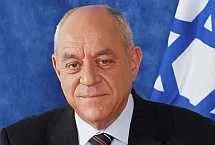The meeting was devoted to discussing possible actions by the state to handle the expected slowdown in both the global and Israeli economies
Israel's economic leaders met last week Minister of Finance Ronnie Bar-On to discuss the economic crisis and its ramifications on the economy.
The meeting was devoted to discussing possible actions by the state's in the coming few months to handle the expected slowdown in both the global and Israeli economies.
Attending the meeting were the chairman of the Histadrut labor federation, Ofer Eini, and senior officials from the treasury and the Bank of Israel.
The leaders of most business sectors also attended, including Manufacturers Association of Israel president Shraga Brosh, Federation of Israeli Chambers of Commerce president Uriel Lynn, Lahav Israel Association of the Self-Employed president Yehuda Talmon, Institute of Certified Public Accountants in Israel president Reuven Schiff, Association of Buildings and Contractors in Israel president Nissim Bublil, and Israel Hotels Association president Eli Gonen. Histadrut chairman Ofer Eini will also attend.
Senior officials from the treasury and the Bank of Israel included Ministry of Finance director general Yarom Ariav, Budget Director Ram Belnikov, Accountant General Shuki Oren, Supervisor of Capital Markets, Insurance and Savings Yadin Antebi, National Economics Council chairman Prof. Manuel Trajtenberg, Bank of Israel officials, Prof. Dan Zidon, and Prof. Rafi Melnick.
Bar-On also said he "did not rule out state intervention, as that is part of my responsibility as finance minister”.
Bar-On repeated his stance on the 2009 budget, saying it was important to keep to budgetary principles.
Brosh proposed accelerating investments in infrastructure projects and setting up a joint fund of the state and banks to provide credit for small and medium-sized exporters.
Lynn proposed that the state provide NIS 5 billion in loan guarantees via the banks and provident funds to be used to provide credit to firms and institutions. He said the loans would only be provided to healthy companies that have a good chance of surviving, and according to set criteria supervised by the Bank of Israel.
Israeli economic leaders met to discuss the economic crisis
The meeting was devoted to discussing possible actions by the state to handle the expected slowdown in both the global and Israeli economies
00:00 ,27.10.2008
-
Found it useful? Share
-
Share on Facebook
-
Share on X
-
Share on LinkedIn
-
Share via Email
-
Share on WhatsApp
-
Print Article
Related
 22.10.2008
22.10.2008
World Bank ranks Israel 30th out of 181 countries for ease of doing business
 22.10.2008
22.10.2008
IMF: Israel's GDP & inflation falling in 2009
 22.10.2008
22.10.2008
Ben Gurion Airport: passenger traffic up 9.3% in September
 22.10.2008
22.10.2008
CBS: CPI at 0% in September
 22.10.2008
22.10.2008
Israel National Employment Service: global financial crisis could worsen unemployment
 12.10.2008
12.10.2008
Israel's Central Bank made surprise interest rate cut amid market uncertainty


